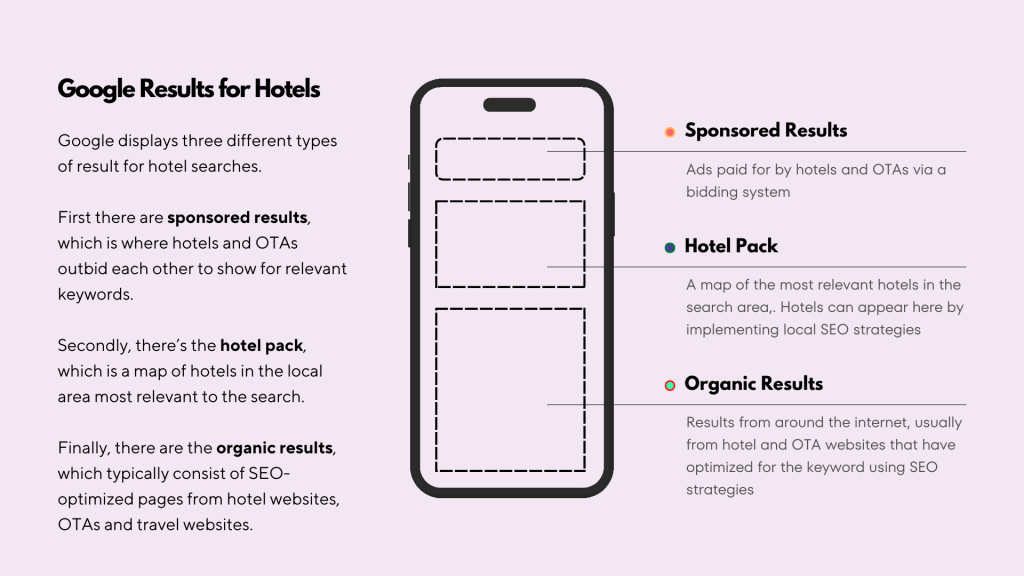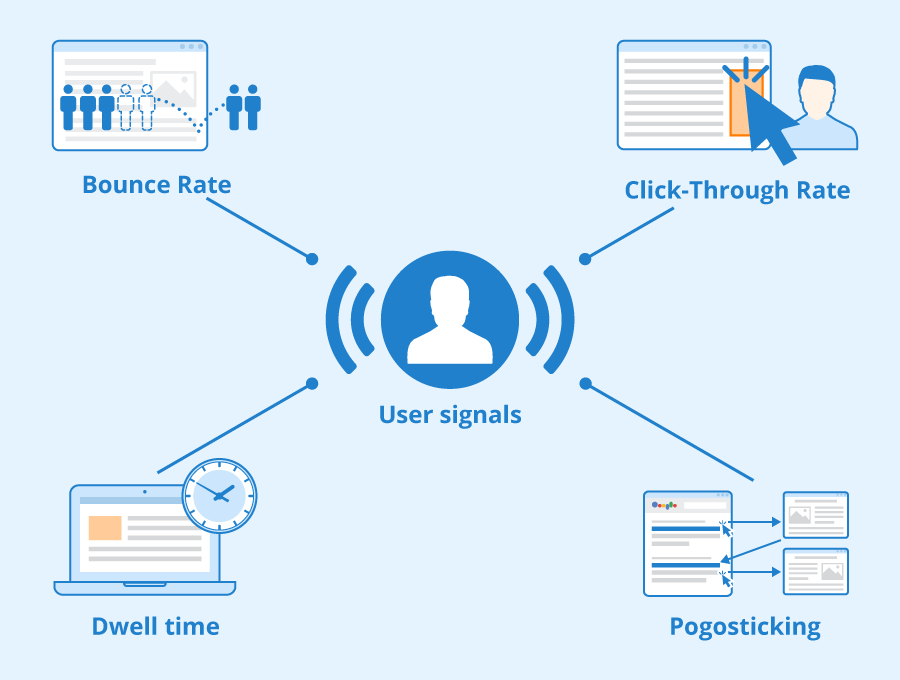
As a hotelier or hotel marketer, you’re probably familiar with the concept of hotel meta descriptions and the role they play in optimizing your hotel website for search.
However, meta descriptions are an often misunderstood part of hotel SEO. In this post, we’re going to look at what meta descriptions are, why they’re important for hotels, and give some best practices and examples to make sure that you are correctly implementing meta descriptions across your hotel website.
Let’s dive in.
An introduction to meta descriptions
In short, meta descriptions are brief textual descriptions that tell searchers what a page on a website is about.
They appear on organic search results like this, which is a meta description from the Hyatt Regency Hotel in Madrid:
Meta descriptions are added into the <head> section of your page’s HTML, either manually or with a plugin such as Yoast for WordPress. Here’s what that same meta description above looks like ‘under the hood’:
<!DOCTYPE html>
<html>
<head>
<meta name="description" content="Hyatt Regency Madrid Residencies, 5-star hotel apartments, features luxury accommodation and spacious rooms with incredible views of Paseo de la Castellana.">
</html>
</head>
Since meta descriptions appear on organic results, they typically show underneath the map pack for hotel searches (to learn more about the map pack for hotels, check out our guide to local hotel SEO!).

Why meta descriptions are important for hotel SEO
With so much competition for real estate on the search engine results pages (SERPs), you can think of meta descriptions as a ‘pitch’ to convince searchers to click through to your website.
They’re important for hotel SEO because they allow you to have a certain amount of control over the messaging of your brand in search results, and to use that message to persuade potential bookers to click through.
However, unlike other elements of the search results snippet, such as the title tag, these descriptions don’t necessarily have to be optimized for keywords, because meta descriptions are not a ranking factor on their own.
That doesn’t mean they are not important for ranking, though. Let me explain.
One of the many components that goes into deciding what gets ranked on search engines and where is a group of factors called user signals. These signals include actions taken on your site, such as sessions, time spent on page and, crucially for meta descriptions, click-through rate (CTR).

Click-through rate (i.e the proportion of people who click through to your result vs the amount of people who see the result) can be considered an indirect ranking factor. This means that CTR is one of the things you should be looking to optimize for your hotel; not only for its SEO benefit, but to increase the amount of potential visitors to your hotel’s rooms, facility and blog pages.
So, we’ve established that meta descriptions are important, to some degree. Yet, paradoxically (as with many things in the world of SEO) writing a good meta description isn’t a guarantee that search engines will show it in the SERPs.
Sometimes, Google ignores the provided meta description and serves their own text snippet, which is based on the content on your page and various factors such as the user’s search history, location and intent.
There’s no way to know when this will happen, or to control the end result. We do find that well-crafted meta descriptions, however, tend to be served up by Google in their original format.
With that in mind, let’s find out how to write a hotel meta description that follows best practices and converts into clicks to your hotel website.
Are you losing bookings from bad SEO on your hotel website? Our comprehensive travel site SEO audits will give you an actionable checklist to plug the gaps and get your site running at full performance – and our SEO experts can implement the fixes for you too, on an ongoing basis. Why wait? Get in touch today for a free consultation.
Best practices for writing hotel meta descriptions
Meta descriptions are not explicitly a ranking factor, so there’s no need to include keywords inside them. Rather, they should be brief, explanatory, have an engaging call-to-action and say something about the unique selling points (USPs) of your hotel.
The best practices to follow for hotel meta descriptions are:
- Explain the page: if you’ve got your search intent right, then the searcher is already looking for a page that fits your description. While the content of the page is also described in the title tag, the meta description is a good place to let the searcher know exactly how your page fits their search.
- Include a call-to-action (CTA): with so much competition on hotel SERPs, the meta description is one place where you can make your result stand out with an engaging call-to-action. Short phrases like ‘book now for a 20% discount’ or ‘limited-time offer on Christmas bookings’ work well to create a sense of urgency, and encourage searchers to click through to your listing (which will also increase your user signal metrics).
- Mention your unique selling points (USPs): while you may already have a strong idea about the USPs of your hotel, it’s important to think about what makes your listing stand out from others in the context of individual search intents. For example, if your page is targeting a keyword like ‘hotels with pool in [location]’, include something about your hotel pool that others might not have. Is it heated? Located on the roof? Make space for that in the meta description.
- Keep it brief: the recommendations for upper character limits on meta descriptions are vague, but Google will truncate or cut off meta descriptions that are too long (roughly over 155 characters). To be sure that your description will be displayed in full, you can use this free meta length checking tool, which will give you a visualization of how your meta description will appear in the SERPs.
- Avoid duplicate descriptions: between rooms, packages, offers and content, the amount of pages on a hotel website can quickly become inflated. If this is the case, don’t be tempted to reuse meta descriptions between pages, no matter how similar they might be; this could confuse searchers as to what your page is about.
- Don’t over-optimize: keyword stuffing (aka including unnecessary amounts of a keyword in order to rank a page) no longer works in the world of SEO. That includes meta descriptions. In fact, your meta descriptions don’t need to include their keyword at all. If the keyword isn’t necessary to describe the purpose and value proposition of your page, you can leave it out entirely.
With only 155 characters to play with, the next question is obvious: how do you work all of the above into a single meta description?
Let’s look at some examples of strong hotel meta descriptions that include these best practices while remaining snappy and engaging.
Examples of well-written hotel meta descriptions
In this section, let’s break down a selection of solidly-crafted hotel meta descriptions from around the web.
Pro tip: for more examples of hotel meta descriptions, look up hotel websites in your area by running the query site:sitename.com in Google, which will give you a list of all the pages indexed for that site and their corresponding meta descriptions.
1. Omni Hotels
In this meta description, Omni Hotels in Minnesota are targeting searchers that are interested in hotels with pools. They’ve optimized the meta description of their pools facilities page to include their unique selling points and a CTA for searchers:

✅ USPs: Omni Hotels makes the case that they have not one, but two, heated outdoor swimming pools, as well as a poolside bar and grill.
✅ CTA: ‘Read more about our amenities’ piques the reader’s curiosity, and encourages them to click through to see more about this specific hotel’s offering.
✅ Length: The meta description fits neatly within the snippet, with no truncation from Google.
2. New England Inns & Resorts
This meta description from New Englands Inns & Resorts isn’t for a hotel room or facility, but for an SEO blog post designed to attract new guests to their property.
Writing blog posts to cater to a certain target audience is a common hotel SEO tactic, and in this one, the property has targeted searchers who are looking for girls-only weekend getaways in New England:
✅ Descriptive: The meta description clearly explains what the page is about, with no room for doubt; it’s a a list of ideas for ‘girlfriend getaways’ in New England.
✅ CTA: With the phrase ‘grab the girls and get away’, this property has provided a compelling call-to-action for the searcher to click through to the page and read the list of getaway ideas, which will feature further CTAs for bookings at the property.
3. Bulgari Hotels & Resorts
Bulgari Hotels & Resorts in Shanghai have catered this meta description towards searchers who are looking for luxurious hotel rooftop bars in Shanghai:
✅ USPs: Bulgari in Shanghai makes the case that their hotel rooftop bar offers an Italian-styled ambience; this USP sets it apart in a city famous for its rooftop bars.
✅ Length: The meta description is succinct and to the point, managing to give an immersive, highly visual impression of the terrace bar in less than 30 words.
This particular meta description doesn’t contain a CTA, but we’d argue that it doesn’t need one: Bulgari’s positioning, which leans on class and sophistication, doesn’t really lend itself to excessive CTAs.
Which brings us neatly onto our final point: best practices are only guidelines.
By carrying out tweaking and testing of your hotel meta descriptions and using A/B testing to measure CTR, you can come up with a formula that works for your site and entices your ideal guests to click through and eventually make a booking.
Read next: our complete guide to luxury travel SEO
Conclusion: meta descriptions matter
While meta descriptions aren’t the most complicated part of SEO, they do serve a purpose, and it’s important to nail down the basic early on. They require a touch of creative flair while also keeping best practices in mind; like many aspects of SEO, it’s part art, part science.
Finally, if you’re looking to level up your hotel marketing and get more bookings from search, schedule a free consultation with Parador, the boutique travel marketing experts, to see how we can help you fill more rooms with a long-term digital strategy.

